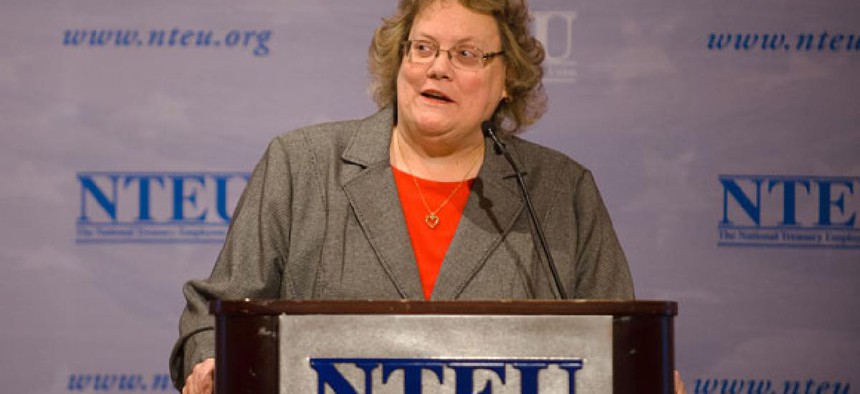
Erin Scott/NTEU
Next up for Agencies: Bargaining Over Furloughs
Most feds expect they will have trouble making ends meet if furloughed due to sequester, union says.
Federal employee unions and agencies are starting to negotiate the details of expected furloughs if sequestration takes effect on Friday.
The head of the National Treasury Employees Union said on Tuesday she expects to schedule a meeting next week with the Customs and Border Protection agency to begin bargaining over the specifics of possible employee furloughs.
Agencies must meet with unions before they send out furlough notices to employees, and they must give furloughed employees 30 days’ notice. If the automatic governmentwide spending cuts take effect March 1 and remain in place, furloughs at some agencies could begin in April.
“We initiated conversations months ago with agencies, and said ‘look we don’t know what’s going to happen, but if anything is going to happen that impacts the employees and the work that they do -- the sooner we start talking, the better,’” said Kelley during a briefing with reporters to discuss a new NTEU survey of feds on sequestration and the impact of budget cuts on their agencies and their wallets. NTEU represents 150,000 employees in 31 agencies; Customs and Border Protection is the only one so far that has notified the union it intends to furlough employees in the event of a sequester, Kelley said. It’s unclear how long the bargaining process will take before furlough notices are sent, Kelley said.
The American Federation of Government Employees, which represents federal workers at some 78 agencies, also have started to engage in bargaining with agencies as well, said David Borer, the union’s general counsel. “I know our DoD folks are talking, our EPA [Environmental Protection Agency] folks are talking,” Borer said. “We’ve encouraged people, ‘don’t wait, get in there and talk.’”
The White House has said the sequester could result in hundreds of thousands of employees furloughed across government. Several departments, from Defense to Transportation, have warned they will have to furlough large numbers of employees to comply with the $85 billion in budget cuts the entire government needs to produce by the end of fiscal 2013.
Most agencies have not issued official furlough notices to employees yet. But the Office of Management and Budget said the Justice Department and the National Labor Relations Board have in fact already sent official furlough notices to some employees. OMB has directed agencies to furlough only as a last resort if they cannot come up with other ways to achieve the required spending cuts under the law.
Kelley said several details of how furloughs are implemented are negotiable, including whether unpaid leave days are spread over several pay periods or consecutively. “There will be all kinds of personal situations,” Kelley said. Whether it’s child care or elder care, Kelley added, employees might want flexibility with their furlough days. Other areas the union could bargain over include protecting employees from being fired or disciplined if they miss work deadlines as a result of being furloughed, or take another job to make ends meet. In many agencies, employees can take a second job, but need approval from the agency. “We would want to make sure there is a very expedited process for those approvals,” she said, adding “we don’t want to see employees taking a second job because they have to, and then being fired from their primary job because they took a second job.”
Eighty-two percent of the 2,258 feds NTEU surveyed said they would have trouble paying their housing, utility and food expenses if they lost pay as a result of furlough. Sixty-three percent of respondents said they will have to take money out of savings or retirement to make up the lost income, and 57 percent anticipated having to take on new debt to make ends meet.
NTEU also asked their members about how budget cuts to date have affected their agencies: 79 percent said their agencies are not replacing workers who leave; 68 percent said their agencies lack the resources to do their jobs properly; 67 percent reported that their employer has imposed a hiring freeze; and 48 percent reported that critical work was not getting done. In addition to CPB, the union represents employees at agencies including the Internal Revenue Service, National Park Service, Food and Drug Administration and Social Security Administration.
Tuesday’s event also featured federal workers from across the country who shared their perspectives on how the automatic spending cuts could affect their agencies and their families. One IRS employee, who has been with the agency for 25 years, said being furloughed would compromise her ability to help pay for her children’s education.
“I love my job and I am grateful for the opportunities it has provided me and my family,” said Marcherie Williams, an IRS program analyst in Philadelphia. “I believe in my work and my agency’s mission for the American people. But the uncertainty and possible furlough, when we have already been hit…it’s just too much, it’s disheartening and it affects us all.”
Montana-based CBP officers Dave and Colleen Matoon, who are married, are worried about the impact of two possible furloughs on their household.
“Families like ours are doubly disadvantaged because we are both federal workers,” said Dave. “We have three children, a daughter that is graduating from college in the spring and we have a 15-year-old and a 13-year-old son that we are trying to save for college for.”
--
This story has been updated with new information that at least two agencies have already sent official furlough notices to employees.
NEXT STORY: Treasury Refills Federal Pension Coffers







